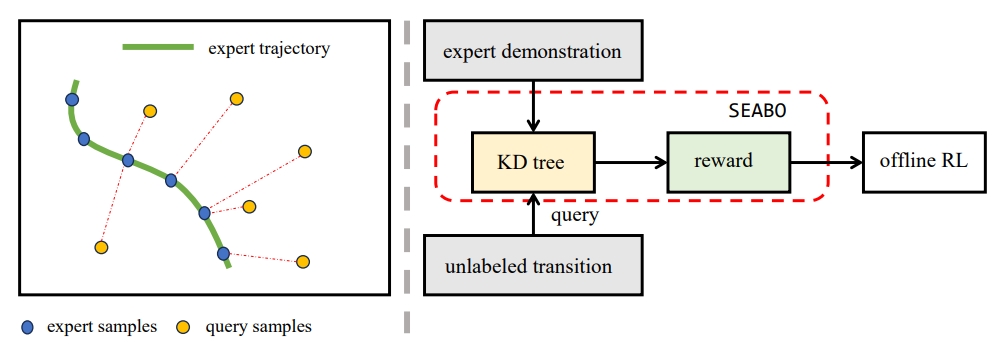SEABO is a simple yet effective method for assigning rewards to unlabeled offline datasets. Our key idea is that if a transition lie close to the expert trajectory, it ought to have a larger reward and vice versa. The illustration of our method can be found below.
For reproducing our reported results in the paper, please check the following instructions.
For IQL+SEABO, on MuJoCo tasks, run
CUDA_VISIBLE_DEVICES=0 nohup python main_iql.py --env halfcheetah-medium-expert-v2 --seed 5 > out.log 2>&1 &
For IQL+SEABO, on AntMaze tasks, run
CUDA_VISIBLE_DEVICES=0 nohup python main_iql.py --env antmaze-medium-diverse-v0 --seed 5 --beta 5.0 --temperature 10.0 --expectile 0.9 > out.log 2>&1 &
For IQL+SEABO, on Adroit tasks, run
CUDA_VISIBLE_DEVICES=0 nohup python main_iql.py --env pen-human-v0 --seed 1 --no_action_dim --temperature 0.5 --dropout_rate 0.1 > out.log 2>&1 &
For TD3_BC+SEABO, on MuJoCo tasks, run
CUDA_VISIBLE_DEVICES=0 nohup python main.py --env halfcheetah-medium-expert-v2 --seed 1 --dir logs/halfcheetah-medium-expert-v2/ > out.log 2>&1 &
python main.py \
--k 1 \
# how many neighbors are used
--beta 0.5 \
# the weighting coefficient
--scale 1 \
# the reward scale
--mode 'sas' \
# what to query, contain actions or not
--no_action_dim \
# whether to include action dimension in the reward calculation
If you use our method or code in your research, please consider citing the paper as follows:
@inproceedings{lyu2024seaboasimple,
title={SEABO: A Simple Search-Based Method for Offline Imitation Learning},
author={Jiafei Lyu and Xiaoteng Ma and Le Wan and Runze Liu and Xiu Li and and Zongqing Lu},
booktitle={International Conference on Learning Representations},
year={2024}
}
